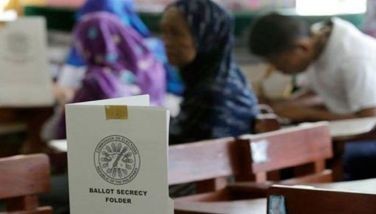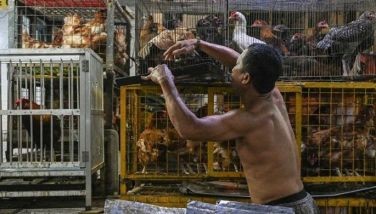COA finds irregularities in use of P728-million fertilizer fund
April 7, 2006 | 12:00am
The Commission on Audit (COA) has found several irregularities in the use of the P728-million fertilizer fund and in the implementation of the Department of Agriculture’s Ginintuang Masaganang Ani (GMA) hybrid rice program in 2004.
Releasing a report prepared by a special audit team led by Flerida Jimenez, the COA said the DA allocated the funds to proponents of the program that were not part of the original list submitted to the Department of Budget and Management.
The report showed Notice of Cash Allocations for P723 million were distributed to the DA’s regional field units, which in turn transferred the funds to the non-government organizations, people’s organizations and local governments for the purchase of fertilizer and other farm inputs and implements.
"The release of the funds from the DA central office to the regional offices may be described as circuitous, consequently, the accountability for such funds became hazy due to poor monitoring," the COA said.
"There was a weak monitoring of liquidation and accomplishment reports. Consequently, the fund could not be fully accounted for, not to mention specific instances of irregularities found in the course of audit."
It was revealed that former DA undersecretary Jocelyn Bolante approved the issuance of Advice of Sub-Allotments and Notices of Transfer Allocations to DA regional field units, listing allocations that did not conform with the original list.
The COA said the General Appropriations Act already contained allocations of funds for development projects prioritized and intended for lawmakers’ constituents under the Priority Development Assistance Fund, also known as pork barrel.
Local governments also have separate appropriations for their own development programs, the COA added.
Apart from the different list of proponents, the amounts indicated in the list were over and above their original allocations as provided for under the Special Allotment and Release Order of the DBM.
Out of the P728 million total released to the DA, P547 million was transferred to the LGUs, NGOs and POs.
However, the DA pointed out that only an average of 59 percent of the funds was liquidated after 19 months.
Under COA rules, the NGOs and POs receiving financial assistance from the government are required to submit financial statements, certificate of project completion and acceptance of project by the beneficiaries or funding agencies and shall return any amount not utilized to the funding government office.
The COA noted that the regional field units returned P14.5 million to the national treasury, but inexplicably increased their total budget for operations by P4.9 million.
All in all, a total of P644.8 million was spent for the fertilizer program, representing the fund transfers to LGUs and NGOs and the payment of suppliers.
Five million pesos was allocated to Region X, but this amount was transferred to the Department of Public Works and Highways for the development of farm-to-market roads.
Another P49 million was transferred by the DA to the Region VIII regional field unit, but the COA could not conduct a proper audit on this as the documents were said to have been gutted in a fire.
DA regional field units in Regions 2, 3 and 11 reportedly spent a total of P4.04 million for maintenance and operating expenses, "unlawfully increasing their budget" instead of reverting all the balances at year’s end to the national treasury as required under law.
The COA report also revealed overpricing in the purchase of foliar or organic fertilizers by an average of 682 percent, or P128 million.
These fertilizers were sourced from so-called exclusive distributors although the items were readily available in the open market.
One particular brand, Prime EC, which contains the highest content of vital components appropriate for rice and corn production, was sold by an outlet at a price of P150 per liter.
In contrast, the NGOs and POs that bought the Prime EC brand of fertilizer paid P1,500 per liter, or an excess cost of 1,000 percent.
Three of the fertilizer brands submitted for tests by the Industrial Technology Development Institute of the Department of Science and Technology revealed chemical compositions that fell short of representations printed on their labels.
"This availability only proved that foliar fertilizer was a common item and that it was readily available in the market so that awards of purchase contracts through negotiation with the so-called exclusive distributors was not justified," the COA found.
Moreover, foliar fertilizer was not among the items recommended under the Tipid Abono Bawas Gastos, Saganang Ani Fertilization Program and Balanced Fertilization Strategy adopted by the Bureau of Soils and Water Management for rice and corn production.
Based on interviews by the COA with farmer beneficiaries of the program, foliar fertilizers are more appropriate for ornamental plants rather than rice and corn.
A huge number of the intended farmer beneficiaries were also unable to receive the fertilizers because of the lack of a distribution system for the fertilizers.
"The lack of basic rules resulted in a hazy accountability for the government funds," the COA noted.
The P728 million in fertilizer funds released to the DA was the subject of a Senate inquiry following allegations that the funds were used to finance the campaign of President Arroyo in 2004. <
Releasing a report prepared by a special audit team led by Flerida Jimenez, the COA said the DA allocated the funds to proponents of the program that were not part of the original list submitted to the Department of Budget and Management.
The report showed Notice of Cash Allocations for P723 million were distributed to the DA’s regional field units, which in turn transferred the funds to the non-government organizations, people’s organizations and local governments for the purchase of fertilizer and other farm inputs and implements.
"The release of the funds from the DA central office to the regional offices may be described as circuitous, consequently, the accountability for such funds became hazy due to poor monitoring," the COA said.
"There was a weak monitoring of liquidation and accomplishment reports. Consequently, the fund could not be fully accounted for, not to mention specific instances of irregularities found in the course of audit."
It was revealed that former DA undersecretary Jocelyn Bolante approved the issuance of Advice of Sub-Allotments and Notices of Transfer Allocations to DA regional field units, listing allocations that did not conform with the original list.
The COA said the General Appropriations Act already contained allocations of funds for development projects prioritized and intended for lawmakers’ constituents under the Priority Development Assistance Fund, also known as pork barrel.
Local governments also have separate appropriations for their own development programs, the COA added.
Apart from the different list of proponents, the amounts indicated in the list were over and above their original allocations as provided for under the Special Allotment and Release Order of the DBM.
Out of the P728 million total released to the DA, P547 million was transferred to the LGUs, NGOs and POs.
However, the DA pointed out that only an average of 59 percent of the funds was liquidated after 19 months.
Under COA rules, the NGOs and POs receiving financial assistance from the government are required to submit financial statements, certificate of project completion and acceptance of project by the beneficiaries or funding agencies and shall return any amount not utilized to the funding government office.
The COA noted that the regional field units returned P14.5 million to the national treasury, but inexplicably increased their total budget for operations by P4.9 million.
All in all, a total of P644.8 million was spent for the fertilizer program, representing the fund transfers to LGUs and NGOs and the payment of suppliers.
Five million pesos was allocated to Region X, but this amount was transferred to the Department of Public Works and Highways for the development of farm-to-market roads.
Another P49 million was transferred by the DA to the Region VIII regional field unit, but the COA could not conduct a proper audit on this as the documents were said to have been gutted in a fire.
DA regional field units in Regions 2, 3 and 11 reportedly spent a total of P4.04 million for maintenance and operating expenses, "unlawfully increasing their budget" instead of reverting all the balances at year’s end to the national treasury as required under law.
The COA report also revealed overpricing in the purchase of foliar or organic fertilizers by an average of 682 percent, or P128 million.
These fertilizers were sourced from so-called exclusive distributors although the items were readily available in the open market.
One particular brand, Prime EC, which contains the highest content of vital components appropriate for rice and corn production, was sold by an outlet at a price of P150 per liter.
In contrast, the NGOs and POs that bought the Prime EC brand of fertilizer paid P1,500 per liter, or an excess cost of 1,000 percent.
Three of the fertilizer brands submitted for tests by the Industrial Technology Development Institute of the Department of Science and Technology revealed chemical compositions that fell short of representations printed on their labels.
"This availability only proved that foliar fertilizer was a common item and that it was readily available in the market so that awards of purchase contracts through negotiation with the so-called exclusive distributors was not justified," the COA found.
Moreover, foliar fertilizer was not among the items recommended under the Tipid Abono Bawas Gastos, Saganang Ani Fertilization Program and Balanced Fertilization Strategy adopted by the Bureau of Soils and Water Management for rice and corn production.
Based on interviews by the COA with farmer beneficiaries of the program, foliar fertilizers are more appropriate for ornamental plants rather than rice and corn.
A huge number of the intended farmer beneficiaries were also unable to receive the fertilizers because of the lack of a distribution system for the fertilizers.
"The lack of basic rules resulted in a hazy accountability for the government funds," the COA noted.
The P728 million in fertilizer funds released to the DA was the subject of a Senate inquiry following allegations that the funds were used to finance the campaign of President Arroyo in 2004. <
BrandSpace Articles
<
>
- Latest
- Trending
Trending
Latest
Trending
Latest
Recommended































